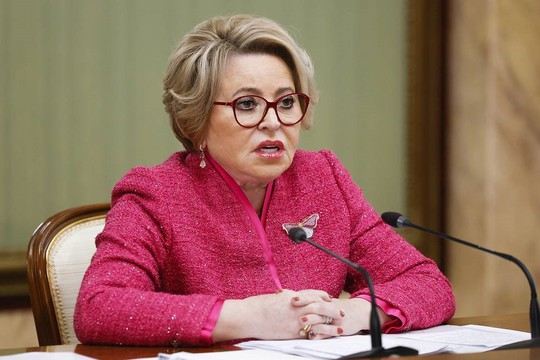Federation Council Speaker Valentina Matviyenko
Photo: TASS
The exposure of fabricated claims about Russia's interference in the US presidential election has backfired for America and its intelligence services, Federation Council Speaker Valentina Matviyenko said at a press conference after a spring parliamentary session.
She noted that the sanctions imposed by the West against Russia have not achieved their goals, and threatening the country with new restrictive measures is futile.
TASS has compiled the main statements of the Speaker of the Federation Council.
About the US fabrications about Russia's interference in the elections
The exposure of fabricated claims about Russia's interference in the US elections was a blow to Washington's reputation: "The level of manipulation that was carried out, the forgery of invented facts, the falsification of accusations against a particular state is, of course, a disgrace to the United States."
The United States should lift the sanctions imposed for Moscow's alleged interference in the American elections: "It was not just a fake, invented by someone, but a deliberate provocation by that US administration. Well, if you have admitted, gentlemen, that this is a lie, this is a fabrication, then you will cancel everything that you have done based on this lie."
About relations with the United States
Russia is ready to continue contacts with the United States: "We are interested in being not only listened to, but also taken seriously."
The meeting of the presidents of Russia and the United States, Vladimir Putin and Donald Trump, will take place sooner or later: "I think that sooner or later such a meeting will certainly take place."
With the coming to power of President Donald Trump, Russia and the United States have restored not only political dialogue, but also active cooperation between the special services: "In addition to political dialogue, there is active communication between the special services, which, in my opinion, is very important. It seems to me that this security safeguard principle has been restored."
The judgments that Russia had inflated expectations of a change of power in the United States are wrong: "We look at things pragmatically."
Relations between Russia and the United States cannot be reduced solely to the situation around Ukraine: "They have a broader dimension. And not only for bilateral relations, but also for global politics in general."
On negotiations with Ukraine
Russia will strive "to ensure that the threat never comes from the territory of Ukraine again."
The third round of negotiations with Ukraine is a positive trend: "Russia has constantly insisted and initiated the start of the third round of Russian-Ukrainian negotiations. The very fact that negotiations are underway and that the third round has taken place are, in my opinion, positive results."
Kiev seems to be "serving its time" at the Russian-Ukrainian negotiations, "there is no real, sincere interest on the part of the Ukrainian side to negotiate and sign a peace agreement."
There are no substantive reasons for a meeting between Putin and Vladimir Zelensky: "There is no subject at all for the meeting. It just doesn't exist today."
About the allegedly abducted children
Kiev's data on the number of children allegedly taken out of the country is unreliable, while the fate of some Russian children is unclear. "It is good that there is dialogue on children, on the return of children. We openly, honestly, in numbers, and by name say that Ukraine's information is absolutely untrue about the number of children allegedly taken out of the country."
On sanctions against Russia
Europe's sanctions outbursts against Russia may shake the global economy: "This will have an overall impact on the global economic level."
Sanctions imposed by the West against Russia have not achieved their goals, it is pointless to scare Moscow with new restrictive measures: "And it is futile to frighten us with sanctions, because we have made our choice, we have relied on our own development, on our own potential, on the development of international cooperation with a wide range of countries that are ready to cooperate on the principles of mutual benefit, mutual respect, and this cooperation is developing and expanding."
The importance of studying history
The emphasis on in-depth study of Russian history by schoolchildren is correct: "I believe that, first of all, school curricula and school textbooks should objectively reflect the history of our country. And all children should study [Russian history] in school, not fluently, not among others, it should be a serious subject, a serious study of the history of their state."
Passing the Unified State Exam in history as a prerequisite for admission to humanitarian universities is necessary: "It has been decided that from 2026 it will be a voluntary principle - if you enter, say, the Philosophy Faculty, you can voluntarily take the history exam. Starting from 2027, it will be mandatory. I support this decision, it seems to me that it is right, and there are no serious arguments to deny the need for this."
The Federation Council will seek affordable prices for school textbooks: "We are asking the executive branch two questions. First, either you reduce the prices of textbooks, or you increase subsidies to the subjects of the Russian Federation, sufficient to fully provide schoolchildren with textbooks. Such a decision should be made by the executive branch. But there has been an active movement in the right direction."
read more in our Telegram-channel https://t.me/The_International_Affairs

 17:14 24.07.2025 •
17:14 24.07.2025 •























